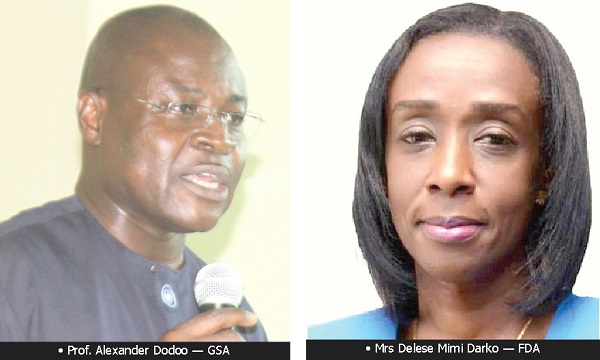From October, the Ghana Standards Authority (GSA) and the Food and Drugs Authority (FDA) will begin to implement the harmonisation of their activities that are similar in a bid to eliminate existing overlaps in their work and their attendant impact on industry.
The harmonisation will also help reduce the cost of regulatory approval and product certification for importers and manufacturers.
“The FDA-GSA collaboration will ensure that local producers no longer have to go through two separate processes to obtain regulatory approval from the FDA and certification from the GSA.
“By sharing data and clarifying test and inspection procedures, industry should expect lower overall charges and faster turnaround times,” the Director General of the GSA, Prof. Alexander Dodoo, and the Chief Executive Officer (CEO) of the FDA, Mrs Delese Mimi Darko, told the Daily Graphic in a joint interview in Accra yesterday.
Implementation
Streamlining the activities of the two institutions is expected to significantly reduce the cost of product registration and certification, as importers and manufacturers will not have to pay double for the similar product registration and certification services provided by the two institutions.
Mrs Darko and Prof. Dodoo said the decision had become necessary because “upon the establishment of the FDA, the continuous certification of FDA-regulated products by the GSA duplicated some of the processes involved in the FDA’s regulatory approval for products, which made industry complain of the burden of the duplicated processes on their cost and time of doing business in the country”.
They said some industry players felt that since the processes for both requirements were similar, there was no need to acquire both.
“This position taken by industry defeats the respective mandates of both institutions to protect public health and safety, as well as the facilitation of trade,” they noted.
Prof. Dodoo said when their operations were fully harmonised, it would help clarify the respective mandates of the two agencies to improve ease of doing business in the country and help identify and streamline the complementary roles in the operations of the two institutions.
Aside from the benefit of the collaboration for importers and producers, Mrs Darko said, it would also benefit consumers significantly, since the cost of registration and certification was usually pushed onto the consumers.
Common platform
The two institutions are expected to roll out the road map to guide them to streamline their activities, beginning from next month.
Prof. Dodoo said the two agencies had agreed to streamline their processes to ease the acquisition of registration approval and certification.
“The two agencies will expand their respective enforcement activities by relying on the enforcement-related data collected by one agency or the other to collect data on the presence of both the certification mark and the FDA number and share such data,” he noted.
He said the two agencies would operate efficiently and optimally in adopting the approach and also create a common platform like the Single Window to manage the submission of documentation for processing.
To help local manufacturers gain maximum benefits from the African Continental Free Trade Area (AfCFTA) agreement, he said, the two regulators had agreed that local industries that had complied with the two basic requirements — the regulatory approval by the FDA and certification by the GSA — could begin to effectively target export markets to sell their products.
“It is envisaged that the GSA would rely on some data collected by the FDA for aspects of its registration process. This means that GSA charges for certification in those specific cases will have to be reviewed downwards to reduce the financial burden on industry,” he said.
Industry optimistic
The CEO of the Private Enterprises Federation (PEF), Nana Osei Bonsu, told the Daily Graphic in an interview that the harmonisation was good for efficiency, and that would help private institutions save time and money.
“I believe that such harmonisation between such institutions is good for the business community because, aside from the double cost involved, they also take a lot of production time and that is not efficient,” he said.
The CEO of the Association of Ghana Industries (AGI), Mr Seth Twum-Akwaboah, also told the Daily Graphic: “In the context of the streamlining of their activities, such that firms don’t go to the two places for the same things, it is good for us as industry people.”
He said the move, which had been on the table of the AGI’s advocacy for a while now, was perfect because it would help industry avoid incurring two separate costs for the same activity.

